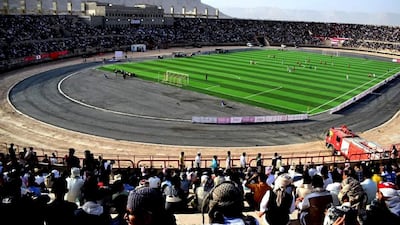After five years of war, competitive football is returning to the liberated provinces of south Yemen.
Last week, more than a thousand fans flocked to Al Hubaishi, the oldest stadium in Aden, which reopened recently after lengthy restoration work. The game was between Wahadat Aden and Telal Aden, teams whose fierce rivalry was suspended by the civil war.
Crowds gathered outside the stadium, eager for word of the game, as seats filled up inside.
“Words can’t express my feelings at this moment. I feel as if I am taken back to the eighties when I was young and I used to attend this stadium regularly to cheer my favourite team, Telal Aden,” said Ahmed Qaiyed, 55.
"War has stolen five years from our life. We lived very critical times seeing nothing but corpses and devastation. It is time to breathe a sigh of relief," said Mr Qaiyed, who attended the game in a wheelchair.
For some viewers, the large turnout at the game was a signal of better times to come.
"It is the most wonderful moment in my life since I started playing football in the Seventies," Jamal Nadeem, who coaches Telal Aden, told The National.
“I didn’t expect such a huge turnout. You see the stadium is full while big crowds outside are struggling to get in. This indicates that people are tired of war and have much thirst to return to the squares.”
Aden was gripped by conflict when Iran-backed Houthi rebels stormed the city in 2015. The rebels, who overran the capital, Sanaa, the previous year, turned state institutions, schools and stadiums into military posts and weapon depots. Historical sites were destroyed, including more than 10 museums and many ancient churches.
“It’s like a nice dream, seeing the hustle and bustle of life returning to Aden. I didn’t imagine that I would watch such huge crowds attend the first match in Al Hubaishi stadium after more than six years,” said Nafea bin Kulaib, a young athlete who was at the game.

“This place experienced heavy clashes between the Houthi rebels and the Southern Resistance in 2015. The Houthis fought hard to capture the city because it is the main gateway to the presidential area where President Hadi was seated,” Mr Bin Kulaib said.
The mood at the match and the large numbers that turned out to watch were seen by many as an indication of sport's power to heal where politics failed.
"The return of the sport activities to our city offers us a glimmer of hope," Noor Sureib, a journalist from Aden, told The National.
“I felt extremely happy watching such a huge turnout attending a soccer match in Aden after years of war and destruction,” she said.
“I was a little disappointed because no seats were allocated for women to attend the soccer game in Al Hubaishi stadium and I wish the officials in the Ministry of Youth will take that into consideration in the future,” she said.
More than three playing fields in Aden have now reopened and several matches took place in recent months. The province of Hadramawt in south-east Yemen also hosted a football tournament this year, with teams from South Yemen and Houthi-held provinces in north Yemen competing.
“The return of sports to Aden and Hadramawt means a lot for us. We have been looking for a reason to feel happy after years of war and violence," said Muneer Boukar, a sports commentator from Hadramawt.
In January, 45,000 fans went to Sayoun Olympic Stadium to watch the final game of the tournament in Hadramawt between Shaab Hadramawt and Wahdat Aden.
Large parts of Hadramawt province were captured by Al Qaeda for more than a year until they were liberated in April 2016 after months of fighting.
Now, as playing fields are gradually reopened and football matches resume, Yemenis are finding cause for hope in the glimmer of normality as they cheer on their teams from the sidelines.

